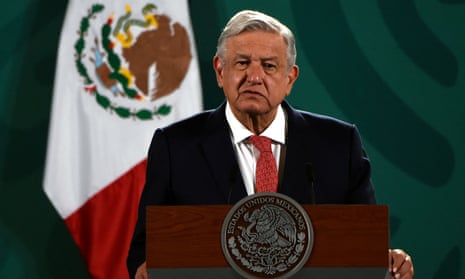Mexican voters have denied President Andrés Manuel López Obrador a mega-majority in midterm elections, though his Morena party kept its majority in the lower house of congress with the support of a controversial ally.
Voters also showed little enthusiasm for Mexico’s rightwing opposition, which remains reviled after its decisive 2018 defeat by López Obrador, who swept to power promising to curb corruption and put the poor first.
The president, widely known as Amlo, welcomed the results, saying on Monday that he was “happy, happy, happy,” with both the turnout and that a majority allowed him to approve budgets targeting the poor.
Mexicans turned out in numbers not seen in recent midterms, with participation hitting 51%. The country also selected governors in 15 states and elected hundreds of mayors and local legislators.
Morena and its allies failed in their bid to win two-thirds of the lower house, which would have allowed him to roll back reforms opening the energy sector to private investment and overhaul autonomous institutions – including the country’s electoral institute, which Amlo has railed against as a biassed and bloated bureaucracy.
“This is a tolerable loss at the margin for Amlo after what’s been a disastrous two and a half years,” said Federico Estévez, professor at the Autonomous Technological Institute of Mexico. “He keeps the institutional power that counts: the budget process and congress.”
A popular, populist and polarizing figure, Amlo still enjoys approval ratings around 60%. But polls offer poor assessments of his handling of the economy, security and the pandemic – which claimed more than 228,000 lives as Amlo took a lackadaisical approach and imposed austerity measures.
Amlo has also been criticized for failing to rein in surging violence. Thirty-six candidates were killed during the election campaign.
“He’s dividing the and country and generating hatred between Mexicans,” said Alejandra Espino, 23, a student who expressed “deep disillusion” with Amlo for the distain he demonstrated toward feminists protesting the scourge of femicide.
“He’s leading a very capricious government,” said Pilar Hurtado, 52, who voted in a well-to-do Mexico City neighbourhood and accused Amlo of being “against the middle class”.
Still, she opted for Morena, saying: “All the other parties are trash.”
Amlo supporters said they appreciated actions such programs of cash payments for seniors and students and raising the minimum wage, and spoke of Amlo’s personal probity.
“It’s not a lot of money, but it helps,” said Marían Campos, 33, a student and single mother who received stipends through one of Amlo’s programs. “Improvements will take time,” she said. “But we’ve seen change.”
Morena and the Workers’ party – a long-time Amlo ally – were projected to win between 260 and 292 seats in the 500-seat lower house and would need the 40-plus seats claimed by the Green party to hold a majority.
The Green party, which has rarely shown interest in environmental issues, has a record of political promiscuity. It has also been repeatedly accused of corruption and won notoriety for flouting election rules and calling for the imposition of the death penalty.
Morena performed strongly on the state-level and was leading in 10 of the 15 gubernatorial races Sunday, according to election officials.
But the biggest setback came in Mexico City, where Covid-19 hit especially hard and where discontent simmered over the collapse of an elevated metro line in May, killing 26 riders. Opposition parties led in nine of the 16 boroughs.
Parties aligned with Amlo had dominated politics in the capital since the late 1990s, but the election “split the city into east and west” with “populists” on one side and “cosmopolitans” on the other, said Federico Estévez. “It’s a class split on cultural terms.”










